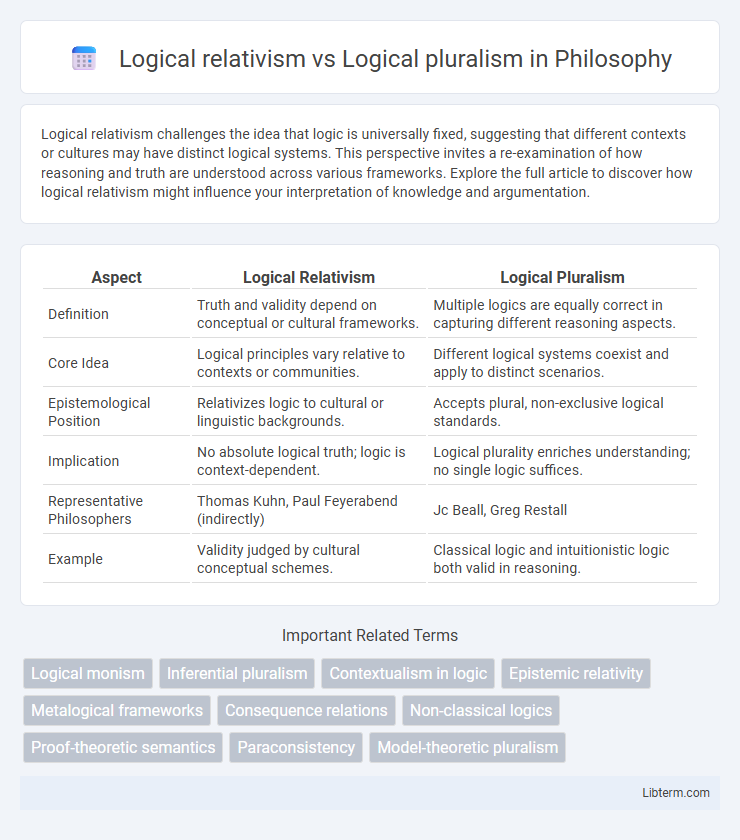Logical relativism challenges the idea that logic is universally fixed, suggesting that different contexts or cultures may have distinct logical systems. This perspective invites a re-examination of how reasoning and truth are understood across various frameworks. Explore the full article to discover how logical relativism might influence your interpretation of knowledge and argumentation.
Table of Comparison
| Aspect | Logical Relativism | Logical Pluralism |
|---|---|---|
| Definition | Truth and validity depend on conceptual or cultural frameworks. | Multiple logics are equally correct in capturing different reasoning aspects. |
| Core Idea | Logical principles vary relative to contexts or communities. | Different logical systems coexist and apply to distinct scenarios. |
| Epistemological Position | Relativizes logic to cultural or linguistic backgrounds. | Accepts plural, non-exclusive logical standards. |
| Implication | No absolute logical truth; logic is context-dependent. | Logical plurality enriches understanding; no single logic suffices. |
| Representative Philosophers | Thomas Kuhn, Paul Feyerabend (indirectly) | Jc Beall, Greg Restall |
| Example | Validity judged by cultural conceptual schemes. | Classical logic and intuitionistic logic both valid in reasoning. |
Introduction to Logical Relativism and Logical Pluralism
Logical relativism asserts that the validity of logical principles varies depending on different cultural, theoretical, or conceptual frameworks, challenging the notion of a single, universal logic. Logical pluralism, on the other hand, accepts the coexistence of multiple legitimate logics that apply in diverse contexts, emphasizing the multiplicity of reasoning standards rather than relativizing truth to frameworks. Both positions critically examine the universality of classical logic, with relativism focusing on context-dependent logical rules and pluralism promoting the legitimacy of multiple, equally valid logical systems.
Defining Logical Relativism: Core Concepts
Logical relativism asserts that the truth-values and validity of logical principles depend on varying frameworks, contexts, or cultural perspectives rather than being universally fixed. It challenges the notion of absolute logical laws, emphasizing that logical norms may shift with different logical systems or interpretative lenses. Core concepts include the variability of logical consequence, context-relative truth conditions, and the rejection of a single, overarching logical standard.
Understanding Logical Pluralism: Key Principles
Logical pluralism asserts that multiple logical systems can be valid simultaneously, reflecting diverse reasoning contexts. It emphasizes the coexistence of various logics, such as classical, intuitionistic, and relevance logic, each suited to different inferential frameworks. This pluralistic approach challenges logical relativism by maintaining that these logics are objectively correct within their respective domains rather than being unavoidably relative.
Historical Background and Philosophical Roots
Logical relativism traces its origins to 20th-century debates challenging the universality of classical logic, influenced by figures like Hans Reichenbach and Rudolf Carnap who emphasized the context-dependent nature of logical systems. Logical pluralism emerged later, notably articulated by philosophers such as Jc Beall and Greg Restall, advocating that multiple, equally valid logical systems coexist, reflecting diverse legitimate inferential practices. Both perspectives derive from critiques of traditional monolithic logic, rooted in the philosophical investigation of meaning, inference, and the limitations of formal systems.
Main Proponents and Influential Theories
Logical relativism, prominently defended by Hilary Putnam, argues that logic varies depending on conceptual schemes, emphasizing context-dependent truth and rejecting a single absolute logic. Logical pluralism, championed by Graham Priest, JC Beall, and JC Smith, posits multiple equally correct logical systems coexist, supported by theories like dialetheism and non-classical logics such as paraconsistent and intuitionistic logic. Both positions challenge classical logic's exclusivity, influencing debates on the foundations of reasoning and the nature of logical consequence.
Comparing the Foundations: Relativism vs Pluralism
Logical relativism asserts that the truth and validity of logical principles depend on cultural or conceptual frameworks, emphasizing context-bound reasoning standards. Logical pluralism maintains that multiple, equally legitimate logical systems exist simultaneously, each capturing different aspects of reasoning without reducing truth to relativism. The key distinction lies in relativism's dependence on external perspectives versus pluralism's acceptance of diverse yet objective logical structures.
Application in Contemporary Logical Debates
Logical relativism challenges the universality of logic by asserting that logical truth varies across different conceptual frameworks, influencing debates around the cultural and contextual dependency of reasoning methods. Logical pluralism, by contrast, acknowledges multiple equally valid logical systems that coexist, offering a framework to reconcile conflicting reasoning patterns in fields like computer science, artificial intelligence, and quantum computing. Contemporary logical debates leverage these theories to address problems in semantics, model theory, and the foundations of mathematics, where the application of diverse logical systems can illuminate problems unsolvable by classical logic alone.
Criticisms and Counterarguments
Logical relativism faces criticism for undermining objective truth by suggesting that logic varies with cultural or conceptual frameworks, leading to potential inconsistencies in reasoning standards. Critics argue that this relativism threatens the universality and necessity of logical laws, diminishing their role in rational discourse. In response, proponents of logical pluralism counter that multiple, equally valid logical systems can coexist without contradiction, emphasizing flexibility in reasoning while maintaining rigorous structure within each logic.
Implications for Truth and Reasoning
Logical relativism asserts that truth and reasoning vary according to different logical systems or cultural perspectives, challenging the universality of logical principles and suggesting that what counts as valid inference depends on context. Logical pluralism, by contrast, accepts multiple correct logics coexisting simultaneously, implying that truth can be multi-faceted and that reasoning is not restricted to a single logical framework but is instead enriched by diverse methods. Both positions reshape traditional concepts of truth and inference, with relativism emphasizing contextual dependence and pluralism highlighting the legitimacy of alternative logical standards.
Conclusion: Future Directions in Logical Theory
Logical relativism challenges the notion of a single absolute logic by emphasizing the context-dependent nature of logical validity, while logical pluralism accepts multiple coexisting logical systems as equally legitimate. Future directions in logical theory involve exploring the boundaries and interactions between these frameworks to develop a more flexible and inclusive understanding of logic. Advances in formal semantics and computational logic are likely to refine these approaches, enabling applications in artificial intelligence and cross-cultural reasoning.
Logical relativism Infographic

 libterm.com
libterm.com